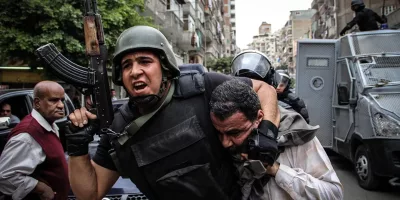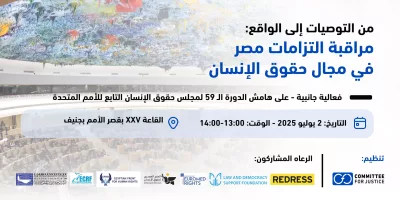On January 24 every year, the world marks the International Day of the Endangered Lawyer to commemorate the killing of four lawyers and their colleague in their office in Madrid in 1977, and to highlight the situation of lawyers who suffer from oppression, torture and even murder due to their work.
This year, the day coincides with several crises experienced by lawyers in Egypt.
The latest example is the Matrouh crisis, which began with the outbreak of an argument between a lawyer and a court employee, then developed into a verbal assault and a clash of hands between a number of lawyers who intervened to support their colleague on the one hand, and the court employees who supported their colleague on the other. The prosecution’s decision – supposedly an objective ruling between the two parties – was to imprison the lawyers for a period of four days, while releasing the court staff. It also issued an arrest warrant against four other lawyers, who have been sentenced to two years in prison.
“Lawyers in Egypt live the worst periods of repression,” the Executive Director of the Committee for Justice, Ahmed Mefreh, said in a statement. “That includes deliberate targeting and intransigence in the exercise of the profession’s duties. We have documented only a fraction of the actual violations committed against lawyers in the country.”
CFJ began in 2018 collecting and classifying cases of human rights violations against 519 lawyers and human rights defenders who were targeted by the authorities with arbitrary deprivation of liberty, prolonged pretrial detention, case recycling, torture, and poor conditions of detention, some of which led to death, An estimated 11 lawyers, including two human rights defenders, have since died in detention facilities.
The months of September and October 2019 also witnessed the largest crackdown by the regime against lawyers and human rights activists, affecting more than 31 individuals in different governorates. The arrests were in the context of the anti-government protests that erupted after revelations of corruption in the Egyptian military by a former army real estate contractor.
Another striking example of targeting human rights lawyers is the case of the arrest of human rights lawyer, Muhammad al-Baqer, director of the Adalah Center for Rights and Freedoms, known for his dedication to providing legal protection to the weak. He was arrested in September 2019, during his defense of his client, the activist Alaa Abdel-Fattah, in Case no. 1356/2019. He was added as a defendant in the same case.
During the same period, CFJ documented the arrest of the prominent human rights lawyer Mahienour El-Masry by the National Security services upon her exit from the headquarters of the State Security Prosecution in Cairo, where she attended the investigations as a lawyer with a number of those who were arrested during the September 2019 demonstrations. On October 16, 2019, CFJ documented the arrest of a prominent human rights lawyer, Amr Imam, from his home in Cairo, when the authorities forcibly disappeared him until he appeared before the Public Prosecution. In January 2021, CFJ documented the enforced disappearance of lawyer Islam Salama for the third time after the Supreme State Security Prosecution referred him in May 2020 to Case no. 1375/2018, and then recycled him into successive cases whenever he received a release decision.
CFJ’s Trial Watch team also documented and analyzed two major cases in the history and practice of the legal profession in Egypt: the first was the case of the Egyptian Coordination for Rights and Freedoms, and the other is the case of the prominent rights lawyer and former member of the People’s Assembly, Ziyad El-Elaimy in the case known as “Detainees of Hope”.
Mefreh added that lawyers were also victims of a new economic burden imposed by the state, through its implementation of a new tax system called the “electronic bill” which further “suffocated lawyers”.
Thousands of lawyers demonstrated in front of their union headquarters in downtown Cairo, in a country that bans demonstrations, against the new electronic invoice system that the Ministry of Finance put into effect, as the lawyers denounced the system that will make them pay exorbitant costs as service providers, which the lawyers objected to as they do not sell a commodity and are not merchants, citing the 2014 constitution, which stipulates that “the legal profession shares responsibility with the judiciary in achieving justice.”
CFJ called on Egyptian authorities to provide an appropriate atmosphere that enables the practice of the legal profession, and to ensure that all lawyers are able to practice all their professional functions without intimidation, obstruction, harassment or improper interference.
CFJ also called on the authorities in Egypt to start an open dialogue with lawyers regarding the new tax system, the “electronic bill”, to reach a solution that contributes to developing the legal profession and preserving the rights of lawyers, and achieving economic support for the Egyptian state at the same time.






